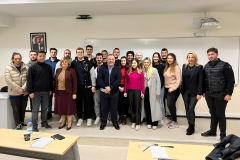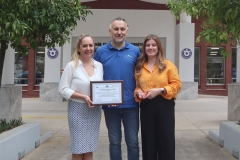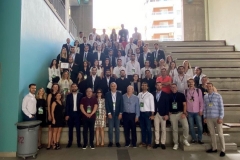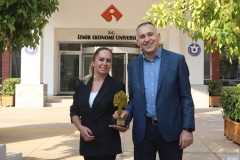
FACULTY OF BUSINESS
Department of Logistics Management
LOG 330 | Course Introduction and Application Information
| Course Name |
Digital Era and Retailing
|
|
Code
|
Semester
|
Theory
(hour/week) |
Application/Lab
(hour/week) |
Local Credits
|
ECTS
|
|
LOG 330
|
Fall/Spring
|
3
|
0
|
3
|
5
|
| Prerequisites |
None
|
|||||
| Course Language |
English
|
|||||
| Course Type |
Elective
|
|||||
| Course Level |
First Cycle
|
|||||
| Mode of Delivery | Blended | |||||
| Teaching Methods and Techniques of the Course | Lecture / Presentation | |||||
| Course Coordinator | - | |||||
| Course Lecturer(s) | ||||||
| Assistant(s) | ||||||
| Course Objectives | The course aims to analyze the big data associated with changing structure of the retail industry. The course aims to enable students to observe, construct and manage big data in different areas of online retailing. |
| Learning Outcomes |
The students who succeeded in this course;
|
| Course Description | The course includes the digitization process, review of business models, dynamics of the retail industry, changing consumer behavior due to technology, big data related to online retailing and real-life big data analysis applications. In order to apply big data analysis in online retailing, course content includes basic building blocks of Python programming and specialized programming. Topics covered are discussed through case studies, classroom practices and discussions. |
|
|
Core Courses | |
| Major Area Courses |
X
|
|
| Supportive Courses | ||
| Media and Management Skills Courses | ||
| Transferable Skill Courses |
WEEKLY SUBJECTS AND RELATED PREPARATION STUDIES
| Week | Subjects | Related Preparation |
| 1 | Introduction to course | Lecture Notes |
| 2 | Changing business models: Distribution channel strategies Omni-channel strategy E-commerce and channel structures | Lecture Notes |
| 3 | Retail industry and its interaction with technology: Web and Mobile applications Generated data Telling stories with data Examples of handling customer reviews and services | Lecture Notes |
| 4 | Introduction to big data I: Sources and cost of data, Data types (associational, relational, geographical), Quality of data | Lecture Notes |
| 5 | Introduction to big data II: Storage and flow of data, ICT systems, Data transfer protocols and standards, SQL, SQL data retrieval and transfer | Lecture Notes |
| 6 | How to read and analyze big data: Introduction to Python I: Syntax, variables, algorithm building, Loops, functions | Lecture Notes |
| 7 | How to read and analyze big data: Introduction to Python II: Syntax, variables, algorithm building, Loops, functions | Lecture Notes |
| 8 | Midterm | |
| 9 | How to read and analyze big data: Data structures Python: Python data structure; files, lists, dictionaries, tuples | Lecture Notes |
| 10 | How to read and analyze big data: Processing Data: File access, input/output processing, String processing; parse, split, search strings, Regular expressions | Lecture Notes |
| 11 | How to read and analyze big data: Access web data, Network, socket, Webservices and API, Web crawling | Lecture Notes |
| 12 | How to read and analyze big data: Database management, XML, Json, REST architecture, Managing and mining database | Lecture Notes |
| 13 | Advanced Analysis with Big Data: sentiment analysis using python I:What is text mining? Sentiment analysis and methods, Sentiment analysis; data crawling, parsing, editing, | Lecture Notes |
| 14 | Advanced Analysis with Big Data: sentiment analysis using python II:Sentiment analysis cnt.; Categorizing sentiment, sentiment polarity, Applications in retailing | Lecture Notes |
| 15 | Review of the semester | |
| 16 | Final exam |
| Course Notes/Textbooks |
|
| Suggested Readings/Materials |
EVALUATION SYSTEM
| Semester Activities | Number | Weigthing |
| Participation |
1
|
10
|
| Laboratory / Application | ||
| Field Work | ||
| Quizzes / Studio Critiques | ||
| Portfolio | ||
| Homework / Assignments |
20
|
|
| Presentation / Jury | ||
| Project | ||
| Seminar / Workshop | ||
| Oral Exams | ||
| Midterm |
1
|
30
|
| Final Exam |
1
|
40
|
| Total |
| Weighting of Semester Activities on the Final Grade |
3
|
60
|
| Weighting of End-of-Semester Activities on the Final Grade |
1
|
40
|
| Total |
ECTS / WORKLOAD TABLE
| Semester Activities | Number | Duration (Hours) | Workload |
|---|---|---|---|
| Theoretical Course Hours (Including exam week: 16 x total hours) |
16
|
3
|
48
|
| Laboratory / Application Hours (Including exam week: '.16.' x total hours) |
16
|
0
|
|
| Study Hours Out of Class |
15
|
3
|
45
|
| Field Work |
0
|
||
| Quizzes / Studio Critiques |
0
|
||
| Portfolio |
0
|
||
| Homework / Assignments |
2
|
15
|
30
|
| Presentation / Jury |
0
|
||
| Project |
0
|
||
| Seminar / Workshop |
0
|
||
| Oral Exam |
0
|
||
| Midterms |
1
|
25
|
25
|
| Final Exam |
1
|
30
|
30
|
| Total |
178
|
COURSE LEARNING OUTCOMES AND PROGRAM QUALIFICATIONS RELATIONSHIP
|
#
|
Program Competencies/Outcomes |
* Contribution Level
|
||||
|
1
|
2
|
3
|
4
|
5
|
||
| 1 | To be able to analyze complex problems in the field of logistics and supply chains |
X | ||||
| 2 | To be able to have good knowledge of sector related market leaders, professional organizations, and contemporary developments in the logistics sector and supply chains |
X | ||||
| 3 | To be able to participate in the sector-related communication networks and improve professional competencies within the business sector |
|||||
| 4 | To be able to use necessary software, information and communication technologies in the fields of logistics management and supply chain |
X | ||||
| 5 | To be able to understand and utilize the coordination mechanisms and supply chain integration |
X | ||||
| 6 | To be able to analyze the logistics and supply chain processes using the management science perspective and analytical approaches |
X | ||||
| 7 | To be able to design, plan and model in order to contribute to decision making within the scope of logistics and supply chains |
X | ||||
| 8 | To be able to interpret and evaluate the classical and contemporary theories in the field of logistics and supply chains |
X | ||||
| 9 | To be able to conduct projects and participate in teamwork in the field of logistics and supply chains |
|||||
| 10 | To be able to have an ethical perspective and social responsiveness when making and evaluating decisions. |
|||||
| 11 | To be able to collect data in the area of logistics and communicate with colleagues in a foreign language ("European Language Portfolio Global Scale", Level B1). |
|||||
| 12 | To be able to speak a second foreign at a medium level of fluency efficiently. |
|||||
| 13 | To be able to relate the knowledge accumulated throughout human history to their field of expertise. |
|||||
*1 Lowest, 2 Low, 3 Average, 4 High, 5 Highest
NEWS |ALL NEWS

Teaching both at Izmir and Sweden
Making a difference with her successful work in the international arena, Assoc. Prof. Dr. Aysu Göçer, Lecturer at Department of Logistics Management,

Memorial Scholarship reached to 78 young people
The education scholarship given on behalf of the late Doğan Turhan, the philanthropist from Izmir, the founder of one of Turkey's largest

‘Green’ logistics going abroad
Assoc. Prof. Dr. Işık Özge Yumurtacı Hüseyinoğlu from Izmir University of Economics (IUE) Department of Logistics Management and her 3 students have

Double prize in logistics
The 'intelligent decision support system' named LTLZone, which was developed by a team of 3 people at Izmir University of Economics (IUE),

Double reward in logistics
The intelligent decision support system (IDSS) named ‘LTLZone’, which was developed by a team of 3 people at Izmir University of Economics

Department of Logistics Management 14th University-Industry Cooperation Event
Izmir University of Economics Logistics Management Department senior students continue to shed light on real logistics problems with the projects they developed






